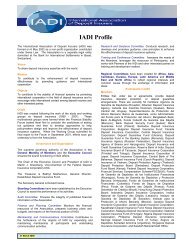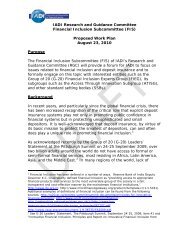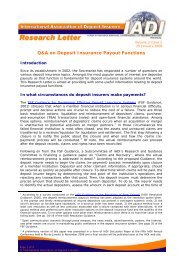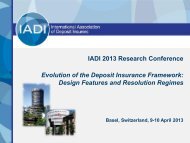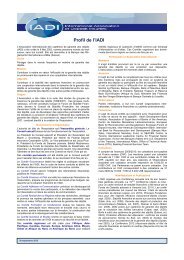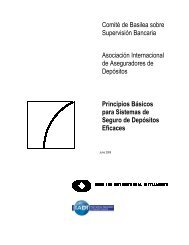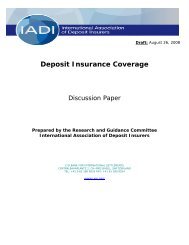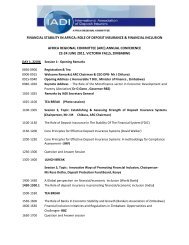Volume II - PDF - International Association of Deposit Insurers
Volume II - PDF - International Association of Deposit Insurers
Volume II - PDF - International Association of Deposit Insurers
- No tags were found...
You also want an ePaper? Increase the reach of your titles
YUMPU automatically turns print PDFs into web optimized ePapers that Google loves.
•BACKGROUND DOCUMENTS•<br />
Part I: Research<br />
deposit insurers <strong>of</strong> the benefits to be gained from<br />
international training, assistance, and collaboration.<br />
Although such assistance and collaboration can<br />
enable deposit insurers to share their knowledge,<br />
the ability to secure necessary funding for such activities<br />
may be beyond the capabilities <strong>of</strong> some deposit<br />
insurance systems. Additional assistance may be<br />
required from stakeholders such as governments<br />
and international organisations.<br />
Most deposit insurance systems need to rely on<br />
confidential information collected from institutions<br />
and other safety-net participants to fulfil<br />
their mandates. Thus, measures to ensure that this<br />
information remains confidential are important<br />
considerations for employees. A number <strong>of</strong> countries<br />
have introduced provisions regarding secrecy<br />
and confidentiality regarding all documents,<br />
information and records pertaining to matters<br />
dealt with by the deposit insurance entity.<br />
In terms <strong>of</strong> legal-liability issues, situations exist<br />
in some countries where employees <strong>of</strong> deposit<br />
insurers and other safety-net participants are held<br />
personally liable for actions taken on behalf <strong>of</strong><br />
their organisations. Although this arrangement<br />
may have been instituted in an effort to improve<br />
accountability, a number <strong>of</strong> countries noted that it<br />
has resulted in serious impediments to employee<br />
and organisational performance. The lack <strong>of</strong> legal<br />
protection can reduce incentives for employees to<br />
be vigilant in the carrying out <strong>of</strong> their mandates—<br />
particularly in cases where mandates emphasise<br />
promptness in detection, intervention and closure<br />
<strong>of</strong> troubled institutions. The Working Group<br />
recognised the importance <strong>of</strong> statutory indemnification<br />
and recommended that staff should receive<br />
legal protection against lawsuits for their <strong>of</strong>ficial<br />
action in the normal course <strong>of</strong> deposit insurance<br />
activities or supervision. 13<br />
Information technology and other issues<br />
Information systems and the use <strong>of</strong> technology<br />
are other important operational areas for deposit<br />
insurance systems. Although specific needs may<br />
vary depending on the type <strong>of</strong> deposit insurance<br />
system in place and its mandate, access to timely,<br />
accurate and consistent information can be<br />
extremely beneficial.<br />
Information management systems that process<br />
information quickly and accurately can help a<br />
deposit insurer detect and deal with problems. In<br />
some cases, this information can be generated<br />
from systems within the deposit insurer, although<br />
in other cases, it may be necessary to retrieve<br />
information from other safety-net participants.<br />
Conclusions<br />
Mandates, roles and responsibilities can vary<br />
widely among deposit insurance systems. It is critical<br />
that the mandates, roles and responsibilities are<br />
consistent with the stated public-policy objectives<br />
<strong>of</strong> the deposit insurance system.<br />
Formal specification <strong>of</strong> the mandates, roles and<br />
responsibilities—either in law, a formal policy<br />
statement or agreement, or by private contract—<br />
and the establishment <strong>of</strong> relationships and linkages<br />
with other safety-net participants enhance<br />
the effectiveness <strong>of</strong> a deposit insurance system.<br />
The mandates, roles and responsibilities <strong>of</strong> the<br />
deposit insurance system should be clear to all<br />
parties concerned. This will reinforce stability<br />
and confidence in the financial system. It also will<br />
contribute to greater accountability and sound<br />
governance <strong>of</strong> the deposit insurance system.<br />
In order to discharge its mandate effectively, a<br />
deposit insurer should have access to requisite<br />
information on its member institutions. The need<br />
for adequate and timely information is particularly<br />
critical because few existing deposit insurers have<br />
broad supervisory authority.<br />
The coordination <strong>of</strong> the activities <strong>of</strong> the safety-net<br />
participants is important for ensuring an effective<br />
deposit insurance system and for avoiding<br />
inefficiencies and conflicts between safety-net<br />
participants.<br />
83<br />
Guidance for Developing Effective <strong>Deposit</strong> Insurance Systems: <strong>Volume</strong> <strong>II</strong>



